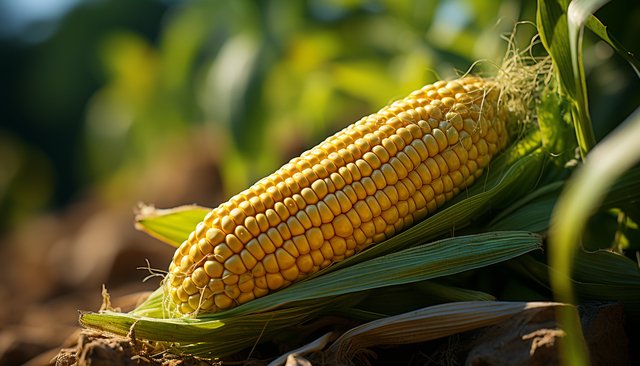The inclusion of corn in a horse’s diet is a topic that has sparked much debate among equine enthusiasts. While corn is a widely available and affordable option to supplement a horse’s feed, its implications on their health and performance are often scrutinized.
In this article, we will research into the pros and cons of incorporating corn into a horse’s diet, as well as provide safety tips to ensure your equine companion’s well-being.
Let’s explore the realities of feeding corn to horses and what every horse owner should know.
Understanding Corn in Equine Nutrition
One of the key aspects of understanding corn in a horse’s diet is its nutritional profile. Corn is a rich source of energy, primarily in the form of carbohydrates.
Also, It contains protein, vitamins, and minerals that can contribute to a horse’s overall health and well-being.
Role of Carbohydrates in a Horse’s Diet
Nutrition experts emphasize the importance of carbohydrates in a horse’s diet as they serve as a primary source of energy for these animals.
Carbohydrates from sources like corn provide the fuel necessary for bodily functions, exercise, and overall metabolic processes in horses.
Corn, as a carbohydrate-rich food, can play a significant role in meeting a horse’s energy requirements.
However, it is crucial to balance corn intake with other important nutrients to ensure a well-rounded diet for your equine companion.
Pros of Including Corn in a Horse’s Diet

Energy Content and Performance
Now, when it comes to energy content and performance, corn is a valuable addition to a horse’s diet.
Corn is rich in carbohydrates, which are an necessary source of energy for horses, especially those involved in high-performance activities such as racing or competitive sports.
The high energy content of corn can help horses maintain their stamina and perform at their best.
Affordability and Availability
Now, in terms of affordability and availability, corn is a cost-effective option for horse owners. Corn is widely available in most feed stores and is relatively inexpensive compared to other grains. This makes it a convenient choice for feeding multiple horses or for those on a budget.
Cons of Feeding Corn to Horses
There’s a longstanding debate in the equine community about the benefits and risks of including corn in a horse’s diet.
According to a comprehensive article on Corn in Horse Feed: Good or Bad?, there are several cons associated with feeding corn to horses that owners should be aware of.
Risks of Overfeeding and Obesity
On the downside, corn is high in starch content, which can lead to overfeeding and potential obesity in horses.
Excessive starch intake can disrupt the delicate balance of the horse’s digestive system, leading to issues such as colic, laminitis, and insulin resistance.
It’s crucial for horse owners to carefully monitor the amount of corn in their horse’s diet to prevent these health problems.
Potential for Mycotoxin Contamination
The consumption of moldy corn or corn contaminated with mycotoxins poses a significant threat to the health of horses.
Mycotoxins are toxic substances produced by certain molds that can cause a range of health issues, including organ damage and neurological disorders in equines.
It’s necessary for horse owners to source high-quality, properly stored corn to minimize the risk of mycotoxin contamination in their horse’s feed.
This highlights the importance of ensuring the quality and safety of corn being fed to horses and the potential health risks associated with mycotoxin contamination.
Safety Tips for Incorporating Corn
For horse owners looking to include corn in their horse’s diet, it is important to follow these safety tips:
- Gradually introduce corn into the horse’s diet to prevent digestive upset.
- Monitor the horse for any signs of allergies or sensitivities to corn.
- Choose high-quality corn that is free from mold and contaminants.
- Avoid feeding corn that has been treated with chemicals or pesticides.
Recognizing the individual needs and reactions of your horse is crucial when incorporating new foods into their diet.
By following these safety tips, you can help ensure that corn is a safe and beneficial addition to your horse’s nutrition plan.
Appropriate Portion Sizes
For horses, corn should only make up a small portion of their overall diet. It is recommended to feed corn in moderation, typically no more than 10-20% of the total diet.
This will help prevent any potential digestive issues or nutrient imbalances that can arise from overfeeding corn.
Importance of a Balanced Diet
Incorporating corn into a horse’s diet can provide additional energy and nutrients, but it should never be the sole focus.
A balanced diet for horses should consist of a variety of forages, grains, and supplements to ensure they are receiving all the necessary vitamins, minerals, and nutrients for optimal health and performance.
This balance is imperative for supporting the horse’s overall well-being, including their digestive health, immune function, and energy levels.
By incorporating corn as part of a balanced diet, horse owners can help meet their horse’s nutritional needs while also providing a tasty treat for their equine companion.
Final Words
Drawing together the pros, cons, and safety tips of including corn in a horse’s diet, it is clear that while corn can provide some nutritional benefits, it comes with potential risks such as digestive issues and imbalances in the diet.
It is essential for horse owners to carefully monitor their horses’ intake of corn and consider alternative options that may be safer and more beneficial for their overall health.
Safety tips such as proper processing and moderation can help mitigate some of the risks associated with feeding corn to horses.
Ultimately, consulting with a veterinarian or equine nutritionist is recommended to ensure that your horse’s diet is well-balanced and tailored to their specific needs.
By staying informed and making informed decisions, horse owners can prioritize the health and well-being of their equine companions.
